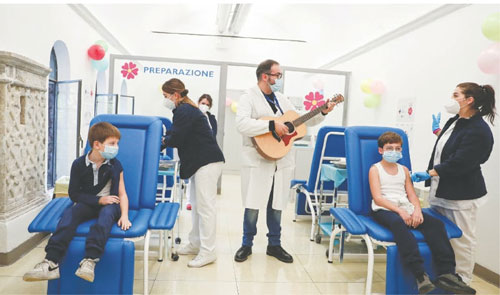Europe stepped up vaccinations of children aged five to 11 against Covid-19 on Wednesday, as the EU’s health agency warned that immunisation alone would not stop the rapid rise of the Omicron variant of the virus.
Croatia, Germany, Greece, Hungary and Spain were among those opening up their inoculation drives to younger kids, with other nations still weighing their approach.
At Hospital Principe de Asturias in Alcala de Henares near Madrid, nurses wearing Christmas antler headbands welcomed children and gave them stickers after their shots.
“It only hurt a little,” said 11-year-old Magdalena Lazo Vitoria as she left the vaccination centre, a plaster on her left shoulder.
“I wasn’t nervous because I wanted to get vaccinated for a long time now, so I am really happy.”
The push was lent fresh urgency by the rapid spread of the heavily mutated Omicron variant, which EU chief Ursula von der Leyen warned could be dominant in Europe by mid-January.
Even as children lined up to get jabs, the EU health agency ECDC said measures like mask-wearing, distance working and the prevention of crowds were essential to reduce the burden on healthcare systems in the time available, with vaccines alone taking too long.
Spanish Prime Minister Pedro Sanchez said he hoped his country, which already has one of Europe’s highest Covid-19 vaccination rates, would become an “example for the world” with its immunisation campaign for five- to 11-year-olds.
The country has around 3.3 million children in that age group. Doctors across Europe reported strong initial demand from parents.
“As soon as we offered the vaccine appointments, they were pretty much all snapped up,” said Jakob Maske, a Berlin-based doctor and spokesman for Germany’s association of paediatricians.
Germany’s STIKO vaccine commission has officially only recommended the jab for children with pre-existing conditions, but even healthy children will be inoculated if the parents request it.
Some German cities plan to administer kids’ jabs in museums and zoos, while others are considering mobile vaccination teams outside schools. While serious illness and death from Covid among children are rare, those infected can pass the virus to other people at higher risk of serious illness, such as the elderly.
The EU’s medicines watchdog last month approved the Pfizer-BioNTech shot for five- to 11-year-olds, an age group experiencing high coronavirus infection rates.—AFP










